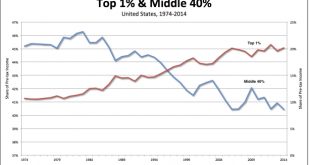from Asad Zaman Summary: My 1000+ word summary of Polanyi’s classic: “The Great Transformation: The Political and Economic Origins of Our Times” has been wildly popular, remaining constantly among the top ten on the RWER Blog since it was was published nearly five years ago. I have recently (25/12/26) revised and updated the post to clean up extraneous elements and clarify the substance in light of readers comments as well as my own improved understanding. Perhaps the most important...
Read More »Mean exchanges
from David Ruccio Yesterday, I discussed the mean-spiritedness of the Republican tax cuts—which are being sold as a gift to the middle-class but, in reality, represent a massive transfer to a small group of large corporations and wealthy individuals. But, of course, the real violence associated with the tax-cut gift occurs before federal taxes are even levied, in the pre-tax distribution of income. As is clear from the chart above, since the mid-1970s, the share of income captured by...
Read More »Heretics and mainstream defenders
from Lars Syll Larry Elliott wrote a Guardian article the other day criticizing mainstream economics, arguing that we should stop treating economics as a science because it is nothing of the sort. A proper science involves testing a hypothesis against the available evidence. If the evidence doesn’t support the theory, a physicist or a biologist will discard the theory and try to come up one that does work empirically. Economics doesn’t work like that. Theories can be shown to work only by...
Read More »Berklee Groove Sessions: Vol. 4 | Eliot Dean Baker
Berklee Groove Sessions is a twice per semester performance opportunity for Berklee students and collaboration between Berklee Groove, Caf Shows, and The Birn. Created to give a more intimate performance experience opportunity to both singers/songwriters/performers and the Berklee community at large, Groove Sessions WELCOMES YOU TO OUR LIVING ROOM. GET INTO THE GROOVE. FEATURING: Paola Arcieri Salim Ali Javiya Minor Eliot Dean Baker with a headlining performance from Shakale Davis...
Read More »Economists — nothing but a bunch of idiots savants
from Lars Syll Let’s be honest: no one knows what is happening in the world economy today … Policymakers don’t know what to do. They press the usual (and unusual) levers and nothing happens. Quantitative easing was supposed to bring inflation “back to target.” It didn’t. Fiscal contraction was supposed to restore confidence. It didn’t … Most economics students are not required to study psychology, philosophy, history, or politics. They are spoon-fed models of the economy, based on unreal...
Read More »Christmas eve, 1717
Source On 24 December 1717, three hundred years ago today, a northwesterly storm hit the coasts of North Europe. About 14.000 died, over 2.000 of these in the Dutch province of Groningen but only 150 in neighboring Friesland. Why this difference? We do know the answer: Friesland had better coastal defences. Frisian ‘dijken’ were better designed, higher and, especially, better maintained than in Groningen. As Frisian public governance of these public goods was better. In 1716, the...
Read More »The European Commission on how (not) to change the Eurozone
Previous posts in this series on central banking: ideas of Willem Buiter, Richard Werner, Thomas Mayer, excerpts from a recent paper by Mike Konczal and Josh Mason, Edward Harris and ideas from the German Handelsblatt shadow council. Today: the European Commission. Why? A lot of people want to change (European) monetary policy and central banking. This includes the members of the European Commission. They want 2 things: A larger Eurozone Some kind of ‘transfer’ union which somehow...
Read More »My philosophy of economics
from Lars Syll A critique yours truly sometimes encounters is that as long as I cannot come up with some own alternative to the failing mainstream theory, I shouldn’t expect people to pay attention. This is, however, to totally and utterly misunderstand the role of philosophy and methodology of economics! As John Locke wrote in An Essay Concerning Human Understanding: The Commonwealth of Learning is not at this time without Master-Builders, whose mighty Designs, in advancing the...
Read More »issue 82 of the real-world economics review
real-world economics reviewIssue no. 82 download whole issue China’s drivers and planetary ecological collapse 2Richard Smith download pdf The Saudi Palace coup, the oil market, China and the United States 29Ali Kadri download pdf Teaching relevant microeconomics after the global financial crisis 47Michel S. Zouboulakis download pdf On microfoundations of macroeconomics 60Prabhath Jayasingh download pdf The trouble...
Read More »Keynes’ intellectual revolution
from Lars Syll Keynes’ General Theory is both a critique and a replacement of classical macroeconomic theory. Both are necessary for an intellectual revolution. On one hand, it is a critique and demolition of classical macroeconomics. On the other hand, it offers a novel alternative theory of the workings of a modern industrial capitalist economy … Keynes’ argument involves sweeping away old theory and introducing new theory. First, Keynes rejected the loanable funds theory of interest...
Read More » Real-World Economics Review
Real-World Economics Review







